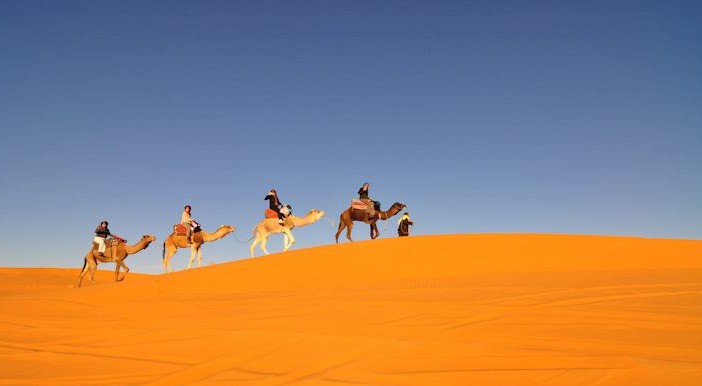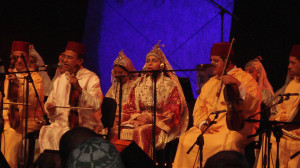Huffington Post
Bernard Foccroulle
The 11th Edition of the Festival des Andalousies Atlantiques
The autumn evening is still balmy and Essaouira’s large sports hall is packed on this last Thursday, Oct. 30. Rabbi Haïm Louk has now taken his seat at the center of the Temsamani Orchestra from Tetuan conducted by Mohamed Amine El Akrami. At his right is seated another great Moroccan musical figure, the Arab singer Abderrahim Souiri. At the age of 72, Haïm Louk continues to be a spectacular tenor, with a voice full of refined colors and hues. Born in Morocco, already early on in his career he took part in the renewal of Moroccan music by developing its relations with the Arab-Andalusian tradition.
After an instrumental prelude that introduces the chosen mode, Haïm Louk’s voice softly starts on a Hebrew melody in the medium register. It then takes off towards a higher register, swirls around a few pivotal notes in a phrase that seems virtually infinite, and then comes down again, elaborating on a series of melismata. Souiri responds in Arab, in the same mode, with inflections that form a subtle variation. At the end of their performances, they hug in a fraternal embrace. The singing of both these artists who are at the pinnacle of their artistry is moving in itself; more importantly, their dialogue adds to the incredible poignancy. It elicits dizzying emotions that live on deep into the night, perpetuated by ancient Muslim brotherhoods, whose combination of singing and dancing brings about a state of trance.
This musical dialogue reflects the ethos of the 11th edition of the Festival des Andalousies Atlantiques, founded and chaired by André Azoulay, and directed by the outstanding singer Françoise Atlan since 2009. Devoted to the common Jewish and Arab musical heritage, this unique event is both a locus of commemoration and a celebration of music at once friendly, festive and full of emotions. During three nights and two days, singers and musicians share their virtuosity, enthusiasm and creative expression. Each morning, André Azoulay brings together artists, intellectuals and the audience in a Riad of the Medina in a symposium about the necessity of returning to these common cultural roots. These morning talks do add meaning to the music heard the preceding evenings.
André Azoulay is keen to remind the audience that until the 1960s, Essaouira was a city where Jews and Arabs lived together in a peaceful and friendly community. At the end of the 19th century, the city had a majority of 18.000 Jewish citizens against a total population of 25.000 – a unique case in the Arab world. Most of the Jews left Morocco in the aftermath of the Six-Day War, forming nowadays a community of about a million Moroccan Jews scattered around the world. However, there are still vivid traces of what had been much more than mere coexistence: during the Festival, numerous artists and participants did give accounts of the fraternal relations and community spirit that were shared among families belonging to either confession.
This shared culture was no exception. Suffice to recall the many thousands of Jews who had been persecuted in Europe throughout the centuries, in particular during the Spanish Inquisition (1492) and the Shoah, who took refuge in Muslim lands. There they were welcomed, and most often, respected and protected too. The history of this shared culture is little known to young Moroccans nowadays. The Moroccan Minister of Education, who attended the Festival throughout, acknowledged that it was necessary to write up this history and correct schoolbooks that deny youth access to this silenced yet vital heritage. Not out of nostalgia for an idealized “Golden Age”, but to show that understanding each other beyond religious and cultural differences is possible. Or even better: that it is possible to benefit from a richer human experience thanks to these differences.
At one of the Festival’s talks, a team of historians and philosophers discussed an ambitious book edited by Abdelwahab Meddeb and Benjamin Stora, published by Albin Michel and entitled Histoire des relations entre Juifs et Musulmans des origines à nos jours (A History of the Relations between Jews and Muslims from the Origins to our Time). Within a rigorous scholarly framework, it charts the complexities of a vivid, entertaining and at times unexpected history, thus doing away with the most widespread clichés and hate-mongering images that haunt the media.
The main ambition of André Azoulay’s organization Essaouira Mogador is not only to foster a retrospective historical perspective: by harnessing examples from the recent and more distant past, his aim is to find the cornerstones for a lasting peace that is crucial to both the world at large, and the protagonists involved in the relentless Arab-Israeli conflict, which is so hopeless and unacceptable. That is why he forcefully advocates the urgency of setting up a veritable Palestinian State, which, in his view, is an indispensable condition for the sustainability and legitimate security of the Israeli State in the long run.
Voices of artists are only tenuously heard on the political scene. However, the emotion that these female and male voices released was indomitable. Françoise Atlan thus brought with her five great Arab and Jewish female singers who performed an explosive finale for the opening evening. Throughout the festival, sacred and festive music relentlessly followed on from each other, being performed by different orchestras all feeding on the Arab-Andalusian tradition. Some amazing dialogues could also be heard: between Haïm Louk and a flamenco singer, between Shadi Fathi, an Iranian musician form Kurdish origin, and Moroccan singers such as Sanaa Marahati, between singers from three different generations, such as Hicham Dinar, Benjamin Bouzaglo and Haïm Louk.
A word by Nelson Mandela stood out in the festival’s brochure: “Politics can be reinforced by music. But music has a power that confounds all politics”. During three days, music and political vision joined forces in a most fertile dialogue. May this spirit of dialogue sow its seeds far beyond Morocco and inspire a world in vital need of it.








